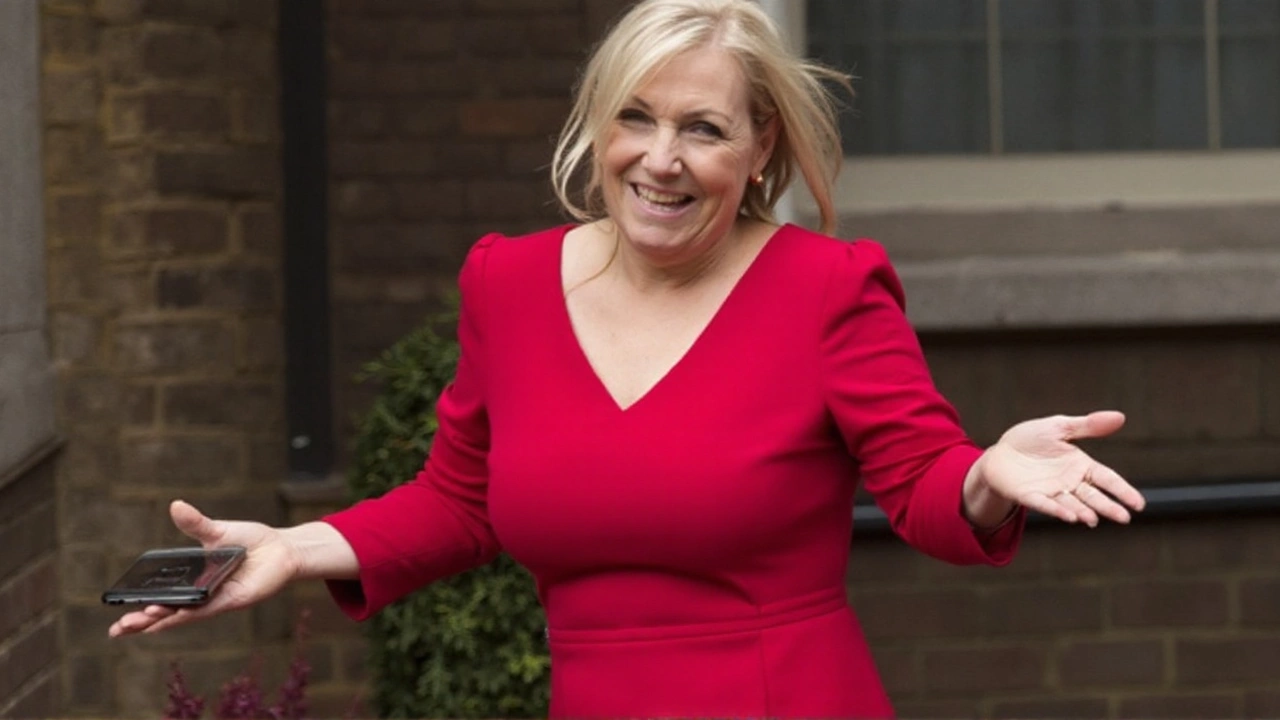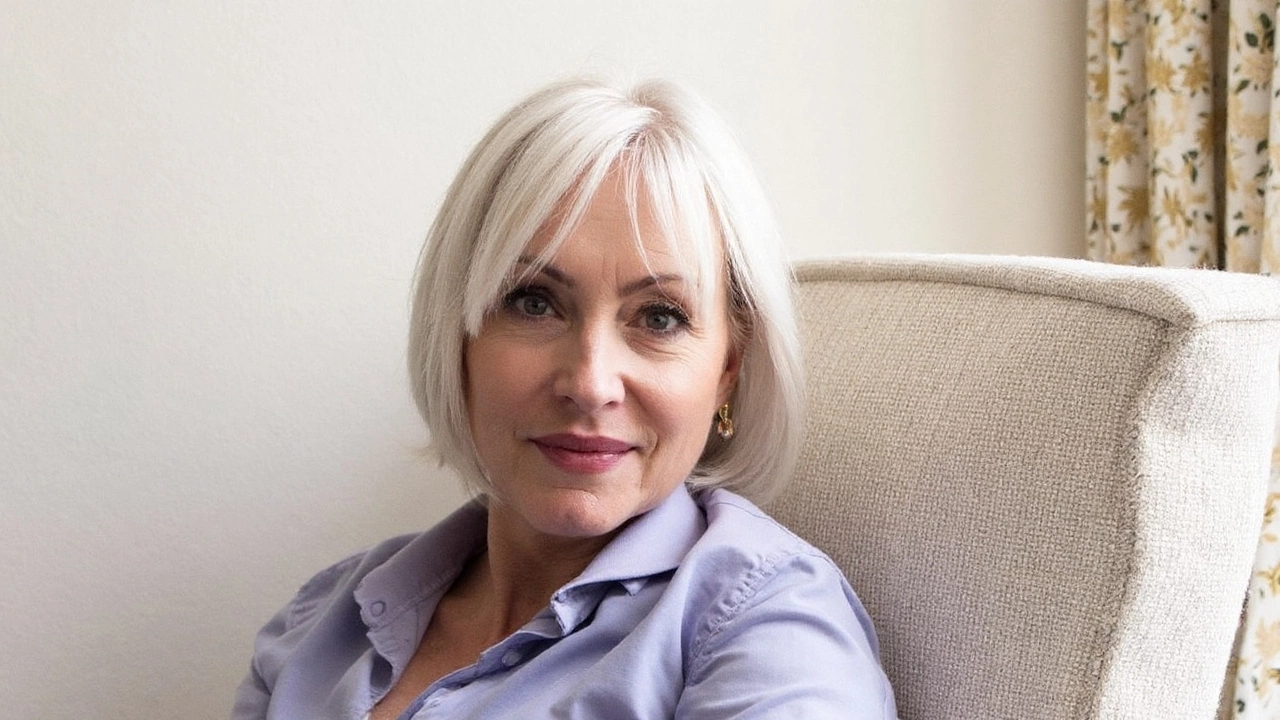A former cabinet minister declares the Tories 'dead' — and walks to Reform
On the eve of Reform UK’s annual conference, former Culture Secretary Nadine Dorries has crossed the floor of British politics — not to another corner of the Conservative family, but to Nigel Farage’s insurgent party. The 68-year-old, who represented Mid Bedfordshire for 18 years and served in Boris Johnson’s cabinet, announced her decision on social media and in an interview, calling the Conservative Party “dead” and accusing it of ditching election winners for “duds.” Farage, never one to underplay a moment, welcomed her as a “big signing.”
The timing was anything but accidental. Reform’s two-day gathering features speeches from the party’s four MPs and senior figures, and Dorries’ arrival gives the event a headline-grabbing jolt. It signals a sharpened pitch to disaffected Tories: if you feel your party walked away from its voters, there’s a new home here.
Dorries says this wasn’t impulsive. She describes a year-long, “agonising” decision after three decades as a Conservative member and nearly two decades as an MP. Her conclusion: the Conservatives can’t win the next election, and the only leader with the “answers, knowledge and will to deliver” is Nigel Farage.
Her broadside didn’t spare Rishi Sunak. Dorries accuses the former prime minister of “demeaning his office” and abandoning core Conservative principles — a legacy she warns “history will not judge kindly.” It’s a familiar refrain from the Johnson wing that never made peace with the post-Downing Street reset. But this time, it comes with a formal defection.
Labour moved quickly to twist the knife. A party spokesperson said Dorries “says the Tory party is dead — as one of the people who helped to kill it, she should know,” reminding voters she backed Boris Johnson “through thick and thin” during the Partygate saga while families were locked down.

What Dorries says — and why now
Dorries’ critique is blunt: the Conservatives removed a proven vote-winner in Johnson, installed leaders who couldn’t connect, and drifted from pledges on borders, tax, and public services. Her message to the party’s grassroots is even blunter — “think the unthinkable” and look to Reform. If you’re a Johnson loyalist who feels homeless, that’s the point.
Reform is happy to make space. In policy tone and rhetoric, the party has planted itself where many 2019 Conservative voters stood: tougher on illegal migration and net migration, more sceptical of costly net zero timelines, more impatient with what it sees as Westminster groupthink. Polling consistently shows the party’s base is far more hawkish on immigration than the public at large — one survey cited by Reform figures found 86% of its supporters want net migration reduced, compared with 58% across the country.
Dorries’ move follows other high-profile Tory departures to Reform ranks, including former party chairman Sir Jake Berry, former Wales secretary David Jones, and Dame Andrea Jenkyns. None match Dorries’ national profile. As a former Cabinet minister, media regular, and bestselling political author, she brings name recognition that few defectors can offer — along with the ability to provoke a response from both her fans and her critics.
The staging matters. Reform’s conference is designed to project seriousness: four MPs, a broadened frontbench-style team, and a tighter message on the economy and migration. Dorries walking onstage bolsters the story the party wants to tell — that the Conservative family is splitting, and the energy is flowing one way.
But how much does this move shift votes? It depends on where you look. In first-past-the-post elections, it’s not national percentages that decide power but local concentration. Reform has punched above its weight in coastal towns, post-industrial seats, and places where voters feel both squeezed on living costs and neglected by Westminster. That’s where Dorries’ endorsement might open doors in Conservative-leaning communities that still warm to Johnson-era politics.
Her critics will say the opposite. They’ll argue this confirms an ongoing estrangement from mainstream conservatism: a leap from a broad-church party to a hard-edged insurgency that thrives on grievance. Expect many on the Tory benches to frame it as theatre — symbolic rather than strategic — especially since she hasn’t been an MP since stepping down in 2023.
Even so, the symbolism counts. Reform wants to be seen not just as a protest vote but as the nucleus of a reassembled right. Each defection, especially one with a ministerial past, makes that claim a little harder to ignore.
Dorries is not a figure without baggage. Over nearly two decades, she courted headlines that cut both ways. In 2009, during the MPs’ expenses scandal, she acknowledged claiming taxpayer money for a lost £2,190 deposit on a rented flat. In 2010, the Parliamentary Standards Commissioner rebuked her after she admitted her blog about time spent in her constituency was “70% fiction.” In 2012, her appearance on I’m a Celebrity…Get Me Out of Here! triggered a suspension of the Conservative whip. For supporters, these episodes made her independent-minded and fearless. For detractors, they made her unreliable and attention-seeking.
Her final act as an MP was messy too. She announced plans to resign in 2023 but delayed, drawing anger from local constituents and MPs, before ultimately stepping down and triggering a by-election in Mid Bedfordshire that the Conservatives lost. Since then, she’s focused on broadcasting and writing, including a blistering account of Johnson’s downfall that accused senior Conservatives of engineering his exit.
That history is exactly why Reform values her. Dorries speaks to a segment of the Conservative base that never forgave the party for toppling Johnson, never warmed to Sunak, and doesn’t trust the current Tory pitch. She also understands how to shape a media narrative — and how to survive the backlash that comes with it.
Nigel Farage knows the power of that combination. Labeling her a “big signing” is part compliment, part provocation. It needles Conservative HQ, suggests momentum, and tells wavering Tory voters: if Dorries can jump, you can too.
There’s also the calendar. A set-piece conference lets Reform roll out policy, crowd-test lines, and put fresh faces front and centre. Dorries can act as validator for voters who see the Conservatives as exhausted but remain wary of smaller parties. If she’s onstage applauding Reform’s proposals on borders, tax thresholds, or NHS waiting lists, it gives the party more social proof than a dozen press releases.
So what exactly is she endorsing? On immigration, Reform wants lower net migration and faster removals for those who fail asylum claims. On energy, it argues for a slower, cheaper net zero path. On the economy, the party talks up tax cuts funded by trimming waste and tightening welfare rules, while arguing for apprenticeship expansion over university-first models. Critics say the sums don’t add up; supporters say the current approach clearly hasn’t worked.
The deeper story is about where the right goes next. If the Conservative Party can’t reconcile its liberal economic wing with its culturally conservative wing, Reform becomes more than a protest: it becomes a rival. That’s the space Dorries is betting on. She’s telling lifelong Tories that their party isn’t temporarily off course — it’s finished in its current form.
Inside Tory circles, that message will infuriate many and resonate with some. MPs in marginal seats worry most about a Reform squeeze on both flanks — peeling off core Tory voters while Labour consolidates anti-Conservative sentiment. Party strategists know the danger: even a modest Reform share can turn safe blue seats into three-way fights.
For Labour, this is a gift-wrapped narrative. The opposition doesn’t need to litigate every policy detail when defectors are doing the work of portraying the Conservatives as fractured and spent. Expect Labour to keep tying Dorries to the chaos of the Johnson years while smiling quietly at the split on the right.
For Reform, the risk is overreach. Momentum is a double-edged sword. When a party is defined by anger at the establishment, voters expect relentless motion — new faces, new wins, new proof. If Dorries is a one-off and no further big names come across, the moment fades. If she’s the first of several, this starts to look like a migration rather than a stunt.
Either way, the immediate effects will be felt in local associations and donor circles. Conservative councillors who admire Dorries’ stance will feel license to flirt with Reform. Right-leaning media will give Reform more airtime. And Tory candidates will face a sharper question on the doorstep: why stick with a party even its former ministers say has lost its purpose?
There’s also the Johnson factor. His loyalists remain a sizable presence in Conservative grassroots networks. Dorries has been one of his most committed defenders. That keeps alive a simmering argument inside the Tory family: was Johnson’s exit a necessary reset after a broken trust, or the original sin that shattered the winning coalition of 2019? Reform’s pitch depends on the latter reading. Dorries is now the face of that case.
None of this guarantees a wave of defections or a map-changing surge. British politics is full of big moments that looked decisive in the headlines and then faded by the weekend. But it does show where the energy sits right now on the right: with the party that’s offering a hard-edged message on migration and a promise to rip up business-as-usual. With Dorries on board, that message just got louder.
What happens next is straightforward to watch, even if the outcomes are messy. Look for who shares a platform with Dorries at the conference, who praises her move publicly, and which local Conservative figures show up in Reform rooms. Watch how the Conservatives respond — with outreach to their right flank, or by dismissing Dorries and doubling down on their current path. And watch Labour, which will be happy to stand back while its opponents fight over the same pool of voters.
For now, Reform gets exactly what it wanted: attention, legitimacy through a familiar Westminster face, and a shot of momentum heading into its biggest weekend of the year. The Conservatives get another reminder that their internal arguments are no longer private. And British politics gets a new line in the sand, drawn by a former cabinet minister who says the Tory Party she served for decades no longer exists in a form she recognises.
